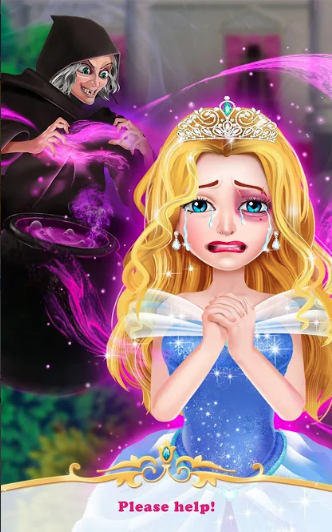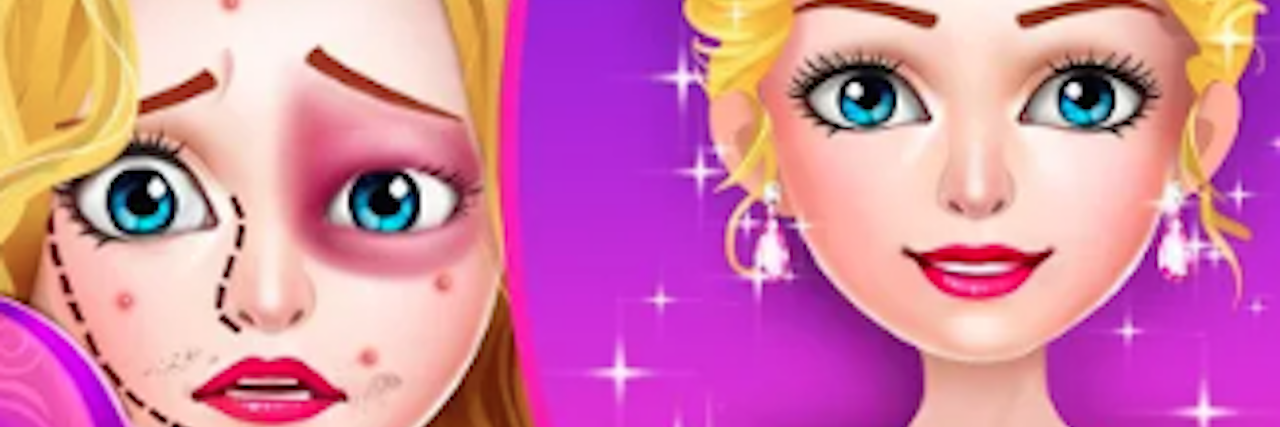Why You Shouldn't Let Your Kids Play Surgery Simulation Mobile Games
Sometimes the news isn’t as straightforward as it’s made to seem. Crystal Hodges, The Mighty’s contributing editor, explains what to keep in mind if you see this topic or similar stories in your newsfeed. This is The Mighty Takeaway.
Many of us grew up playing the game “Operation,” removing butterflies from a man’s stomach and ice cream from his brain to relieve brain freeze.
Recently, the concept of “Operation” has been taken to the next level. Now kids have the opportunity to play free games like “Princess Plastic Surgery,” “Celebrity Plastic Surgery Hospital,” and “Beauty Clinic Plastic Surgery” – games created and distributed by Bravo Kids Media.
The description for “Princess Plastic Surgery” reads:
Princesses are cursed by evil witch! The witch made them ugly! Only you can help them! Don’t miss the chance to become a professional plastic surgery doctor! Making fantastic surgery and give what princesses dream of. Face, nose, eyes, lip, make any plastic surgery that you can imagine!
Looking at the images used to promote the game, one princess has a purple hue around her left eye. Since bruises don’t need plastic surgery to be removed, it’s easy to assume it’s meant to represent a birthmark or something of that nature. Other images include a princess with what looks like a birthmark and acne as well as a princess with a larger and red nose.

Telling kids that facial differences are a “curse,” “ugly” or something that needs “fixing” is problematic. As someone who lives with a facial birthmark, I’m deeply concerned about these types of games and how they’re influencing this generation of children and their culture. As a child, I remember searching video games and different forms of media to find someone, anyone, who might look like me.
What if this was something I stumbled on? My heart would have been broken. Being teased by children on the playground and called “Two-Face,” after the villain from the Batman series, I can only imagine kids asking if a witch had “cursed” me too.
Not only can these games potentially add to stigma and stereotypes of people with facial differences, they can affect the self-esteem of a child with a “larger nose,” acne or a facial birthmark. Plastic surgery games also promote the idea that these “issues” are easy to “fix” — or need to be fixed — by going under the knife when that’s not always the case.
Over the years, I’ve had strangers assume that “doctors surely can do something” about the purple hue on my face and insist I get plastic surgery. One woman once wrote to me while sharing unwanted prayers, “I pray you’ll meet a good plastic surgeon soon!” But it’s not that simple.
Yes, there are options to help with some of my symmetry issues the birthmark has caused due to it being caused by larger blood vessels and their continuous growth, depth and involvement). I can have laser treatments to help keep my birthmark healthy, but one plastic surgery won’t make me look like society’s typical standards of beauty. Even though my birthmark lightens with each laser treatment, I’ve had over 50 and my face is still rather purple. But that’s OK! I find myself feeling sad when I notice my birthmark getting lighter. I only have the treatments because I want to keep my face healthy.
Plastic surgery isn’t a requirement for people like me to love and embrace life. It’s not a requirement for me to live. It’s not a requirement for me to feel beautiful or to be seen by others as beautiful.
On its homepage, Bravo Kids Media encourages young girls to use their talents to “help” fictional people living in the digital world. But are these games really ideal for children when children as young as 8 years old are affected by eating disorders? Can we really be OK with them playing this game knowing that the U.S. has the highest rate of plastic surgeries with 4.2 million procedures performed?
For those concerned about these games and the message they’re sending about beauty, here are a few ideas to help keep them from kids.
1. Sign a petition against the games.
There are currently eight petitions online that you can sign, including one that was created by a representative from The Butterfly Foundation, EMBodIED and Endangered Bodies Australia. Along with creating this petition, Danni Rowlands created a powerful reminder in the form of a hashtag: #SurgeryIsNotaGame.
2. Check your child’s electronic devices.
Do regular check-ins to see what they’re looking at online, what they’ve downloaded and what they’re playing. Do they have the plastic surgery apps on their iOS or Android devices? If so, delete them and check to see what parental controls are available to you.
3. Talk to other parents.
Even if you check and remove unwanted apps on your child’s personal devices, they may have access to these games on a friend’s device. Talk to the parents of your child’s friends and mention the games to them. Tell them your concerns and ask them to check their own child’s devices for these games.
4. Use the power of social media.
Share this article and other articles about the apps to educate others. Use the hashtag #SurgeryIsNotaGame with any social media posts you make about the apps.
5. Whether your child is playing the game or not, make it a habit to remind your child of their worth – and that beauty goes beyond just looks.
On average, children see more than 25,000 ads per year. From beauty products to fashion trends, we need to remind our children that beauty goes beyond our clothes and our makeup. We need to remind them that many of the models they see are often photoshopped. Let them know they’re beautiful just the way they are and don’t just focus on their appearance. Remind your child how good they are at sports, writing and math. Tell them how funny they are, or how you love their creativity and ability to think outside the box.
6. If your child is playing the game, ask them why they like it.
Have a conversation and ask questions. Try and understand what attracts them to the game. Are they drawn to it out of pure curiosity or is there something deeper at play?
7. Let your children know that people with birthmarks, acne or ‘bigger’ noses don’t always consider themselves ‘ugly.’
Yes, many people struggle to accept their acne or facial difference, but most don’t consider themselves “cursed.” These games add to problematic beauty stereotypes, but you can help break them.
Find blogs from people with facial differences or follow body positive Instagramers and let your children learn from them. Let them see everyday people making a difference and help them realize there is beauty in everyone. No matter what they look like or don’t look like.
8. Teach them the realities of plastic surgery.
Let them know that plastic surgery isn’t a simple process. There are risks of complications and infection. And, for some people born with body or facial differences, plastic surgery or reconstructive surgery (as I prefer to call it for people with body differences) isn’t always the “answer.”
Images courtesy of Google Play

